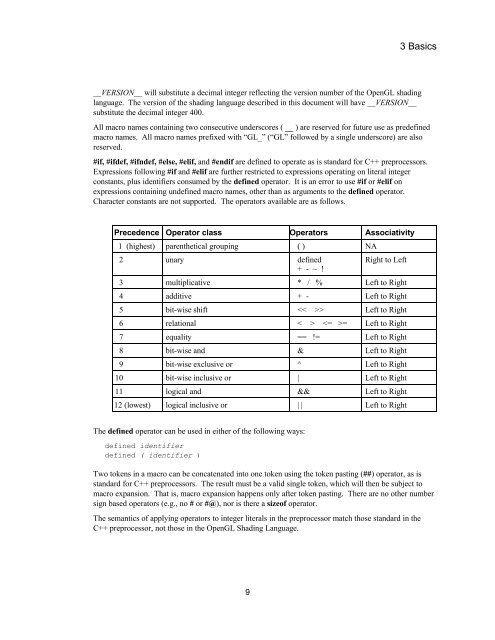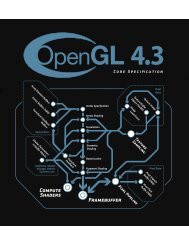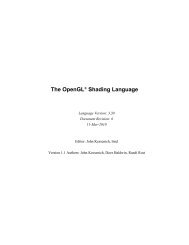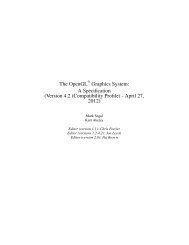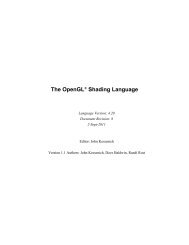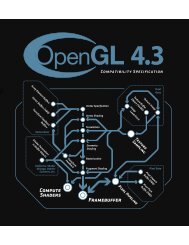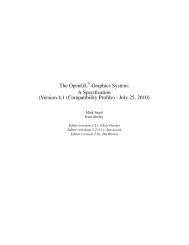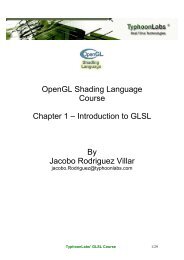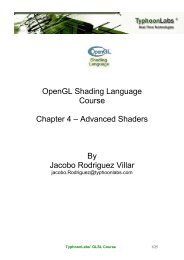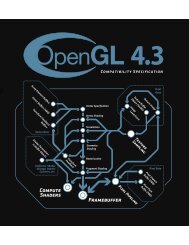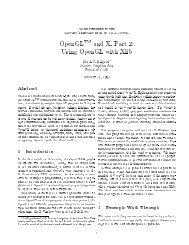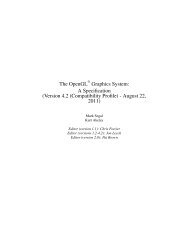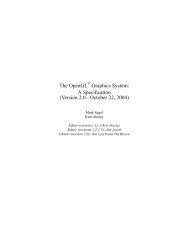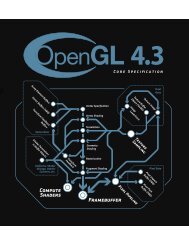You also want an ePaper? Increase the reach of your titles
YUMPU automatically turns print PDFs into web optimized ePapers that Google loves.
3 Basics<br />
__VERSION__ will substitute a decimal integer reflecting the version number of the <strong>OpenGL</strong> shading<br />
language. The version of the shading language described in this document will have __VERSION__<br />
substitute the decimal integer 400.<br />
All macro names containing two consecutive underscores ( __ ) are reserved for future use as predefined<br />
macro names. All macro names prefixed with “GL_” (“GL” followed by a single underscore) are also<br />
reserved.<br />
#if, #ifdef, #ifndef, #else, #elif, and #endif are defined to operate as is standard for C++ preprocessors.<br />
Expressions following #if and #elif are further restricted to expressions operating on literal integer<br />
constants, plus identifiers consumed by the defined operator. It is an error to use #if or #elif on<br />
expressions containing undefined macro names, other than as arguments to the defined operator.<br />
Character constants are not supported. The operators available are as follows.<br />
Precedence Operator class Operators Associativity<br />
1 (highest) parenthetical grouping ( ) NA<br />
2 unary defined<br />
+ - ~ !<br />
Right to Left<br />
3 multiplicative * / % Left to Right<br />
4 additive + - Left to Right<br />
5 bit-wise shift > Left to Right<br />
6 relational < > = Left to Right<br />
7 equality == != Left to Right<br />
8 bit-wise and & Left to Right<br />
9 bit-wise exclusive or ^ Left to Right<br />
10 bit-wise inclusive or | Left to Right<br />
11 logical and && Left to Right<br />
12 (lowest) logical inclusive or | | Left to Right<br />
The defined operator can be used in either of the following ways:<br />
defined identifier<br />
defined ( identifier )<br />
Two tokens in a macro can be concatenated into one token using the token pasting (##) operator, as is<br />
standard for C++ preprocessors. The result must be a valid single token, which will then be subject to<br />
macro expansion. That is, macro expansion happens only after token pasting. There are no other number<br />
sign based operators (e.g., no # or #@), nor is there a sizeof operator.<br />
The semantics of applying operators to integer literals in the preprocessor match those standard in the<br />
C++ preprocessor, not those in the <strong>OpenGL</strong> Shading Language.<br />
9


